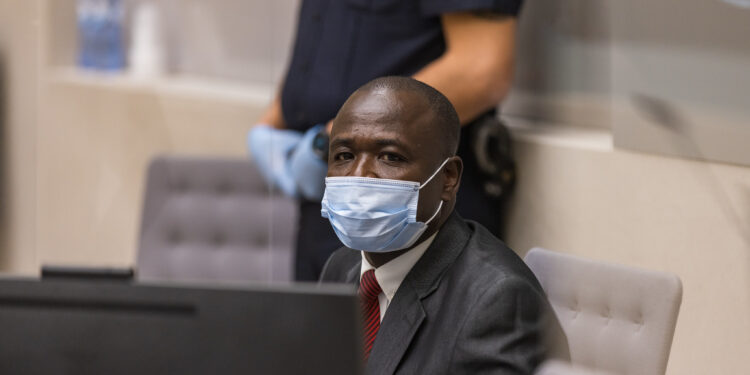The International Criminal Court’s Appeals Chamber has issued seven questions to guide the oral submissions of the parties involved in the hearing of the appeal against the conviction and sentencing of former Lord’s Resistance Army commander Dominic Ongwen.
In the directions issued by Judge Luz del Carmen Ibáñez Carranza (presiding), Judge Piotr Hofmański, Judge Solomy Balungi Bossa, Judge Reine Alapini-Gansou, and Judge Gocha Lordkipanidze, the defence, the Prosecutor, the legal representatives of the victims, and the amici curiae participating in the hearing are asked to use the questions as a guideline to address the defence’s grounds of appeal.
“Additional questions may be put from the bench in respect of the issues outlined below or any other relevant issues under appeal during the hearing,” the judges said in their decision dated January 28, 2022.
The hearing, scheduled for February 14 to 18, 2022, will be held on a partially virtual basis due to Covid-19 restrictions.
The first three questions address the defence’s grounds of appeal excluding criminal responsibility. They are in connection with the burden and standard of proof; mental disease or defect; and duress.
Under burden and standard of proof applicable to excluding criminal responsibility, the oral submissions are expected to address the question of who bears the burden of proof and what standard of proof is applicable in such a case.
On mental disease or defect, the parties should consider whether lesser forms of diminished mental capacity could be compatible with the provisions in Article 31(1)(a) of the Statute, which states that a person shall not be held criminally responsible if it is established that such a person “suffers from a mental disease or defect that destroys that person’s capacity to appreciate the unlawfulness or nature of his or her conduct […]”.
In this regard, they are also asked to consider whether the fact that Ongwen was abducted by the Lord’s Resistance Army (LRA) at a young age could exclude him from criminal responsibility under international human rights law, and if so, how this would be compatible with the object and purpose of the Rome Statute.
On the third question, the parties are to consider how duress, “including the threat of imminent death or of continuing or imminent serious bodily harm”, could be established.
The fourth question deals with the arguments raised by the parties on indirect perpetration and co-perpetration in connection with the LRA structure, its functioning, and the roles of its members, which require an interpretation by the Appeals Chamber. “What elements need to be established, and to what level of specificity, in order to convict an indirect (co-) perpetrator through an organised power apparatus and how can they be established in the present case?” the judges ask.
On sexual and gender-based crimes, the parties are to consider the legal elements of, and the interests protected by the crimes of forced marriage, rape, sexual slavery, and forced pregnancy. They are also to address the question of the scope of “other inhumane acts”, and whether forced marriage is to be considered as one such act, within the meaning of Article 7(1)(k) of the Statute, under which Ongwen was convicted for forced marriage.
The parties are to consider the question of the scope and purpose of cumulative convictions within the legal framework of the Rome Statute, and the relevance of the interest protected by each crime; the principle of fair labelling; and the concepts of consumption and subsidiarity. They are also to consider whether the general principle of ne bis in idem (which forbids one to be judged twice for the same crime) under international law could guide the consideration of the question of the concurrence of crimes, and how it would affect the test for cumulative convictions.
Under the seventh guiding question, on sentencing, the judges ask the parties to consider how the concurrence of crimes and cumulative convictions should be reflected in sentencing and whether, in its determination of the joint sentence, the trial chamber considered the mitigating circumstances alleged by Ongwen’s defence: duress and diminished mental capacity.
The Appeals Chamber invited several groups of individuals to attend the hearing as amici curiae and asked them to select one or two persons to make oral observations.
The judges also released a schedule of the hearing detailing the order in which the defence, the Prosecutor, the participating victims, and the amici curiae will address the Appeals Chamber, and the time allocated for each party over the course of the five days.
The court later issued a revised schedule of the hearing on February 8, 2022, in which it directs the defence, the Prosecutor, and the participating victims to refrain from referring to information classified as confidential during the open sessions of the proceedings.
“In the event that it is necessary to refer to confidential information, the parties and participants shall alert the Appeals Chamber in advance,” the judges said.
On May 6, 2021, Trial Chamber IX sentenced Ongwen to a total of 25 years of imprisonment as a joint sentence after finding him guilty of 61 of the 70 counts of war crimes and crimes against humanity he had been charged with.
Earlier, on February 4, 2021, the court had convicted him of leading attacks on civilians in the Pajule, Odek, Lukodi, and Abok camps for internally displaced persons in northern Uganda between July 1, 2002, and December 31, 2005.
Ongwen’s lawyer, Krispus Ayena Odongo, appealed against the conviction and sentence, raising at least 90 grounds of appeal in his filing of May 21, 2021.
Ongwen is the first Ugandan and former LRA commander to be tried, convicted, and sentenced by the ICC.







